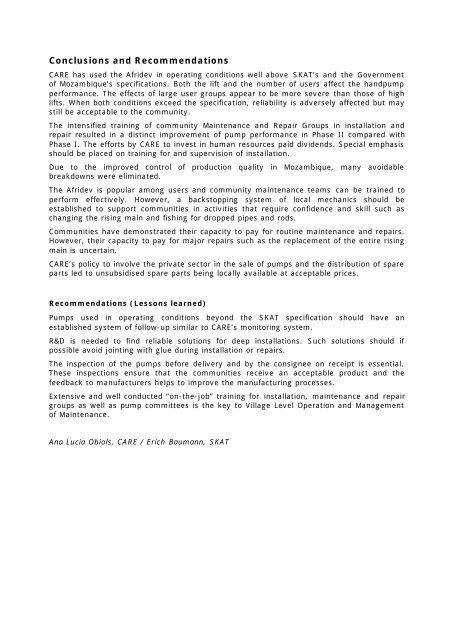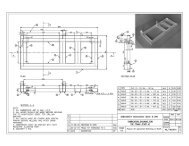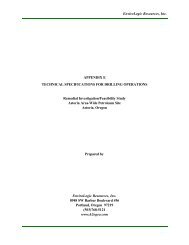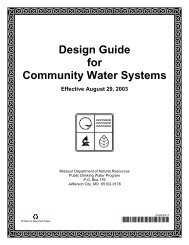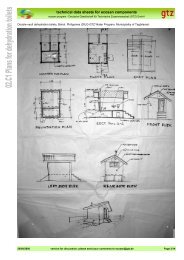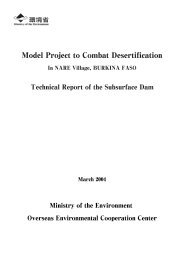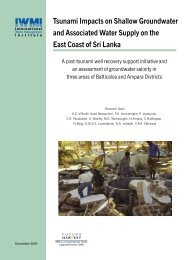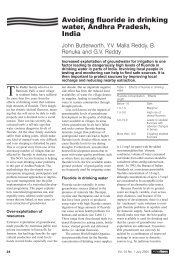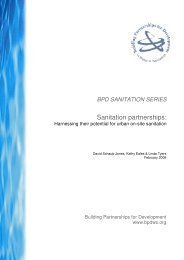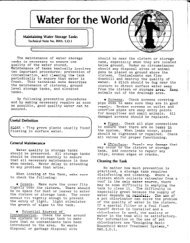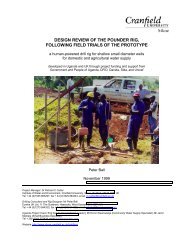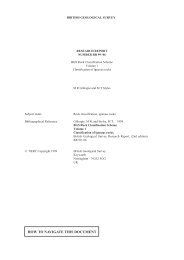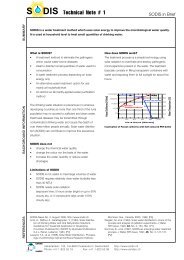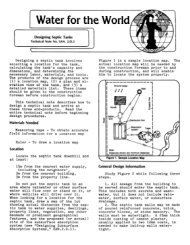Mozambique - The Water, Sanitation and Hygiene
Mozambique - The Water, Sanitation and Hygiene
Mozambique - The Water, Sanitation and Hygiene
- No tags were found...
You also want an ePaper? Increase the reach of your titles
YUMPU automatically turns print PDFs into web optimized ePapers that Google loves.
Conclusions <strong>and</strong> RecommendationsCARE has used the Afridev in operating conditions well above SKAT’s <strong>and</strong> the Governmentof <strong>Mozambique</strong>’s specifications. Both the lift <strong>and</strong> the number of users affect the h<strong>and</strong>pumpperformance. <strong>The</strong> effects of large user groups appear to be more severe than those of highlifts. When both conditions exceed the specification, reliability is adversely affected but maystill be acceptable to the community.<strong>The</strong> intensified training of community Maintenance <strong>and</strong> Repair Groups in installation <strong>and</strong>repair resulted in a distinct improvement of pump performance in Phase II compared withPhase I. <strong>The</strong> efforts by CARE to invest in human resources paid dividends. Special emphasisshould be placed on training for <strong>and</strong> supervision of installation.Due to the improved control of production quality in <strong>Mozambique</strong>, many avoidablebreakdowns were eliminated.<strong>The</strong> Afridev is popular among users <strong>and</strong> community maintenance teams can be trained toperform effectively. However, a backstopping system of local mechanics should beestablished to support communities in activities that require confidence <strong>and</strong> skill such aschanging the rising main <strong>and</strong> fishing for dropped pipes <strong>and</strong> rods.Communities have demonstrated their capacity to pay for routine maintenance <strong>and</strong> repairs.However, their capacity to pay for major repairs such as the replacement of the entire risingmain is uncertain.CARE’s policy to involve the private sector in the sale of pumps <strong>and</strong> the distribution of spareparts led to unsubsidised spare parts being locally available at acceptable prices.Recommendations (Lessons learned)Pumps used in operating conditions beyond the SKAT specification should have anestablished system of follow-up similar to CARE’s monitoring system.R&D is needed to find reliable solutions for deep installations. Such solutions should ifpossible avoid jointing with glue during installation or repairs.<strong>The</strong> inspection of the pumps before delivery <strong>and</strong> by the consignee on receipt is essential.<strong>The</strong>se inspections ensure that the communities receive an acceptable product <strong>and</strong> thefeedback to manufacturers helps to improve the manufacturing processes.Extensive <strong>and</strong> well conducted “on-the-job” training for installation, maintenance <strong>and</strong> repairgroups as well as pump committees is the key to Village Level Operation <strong>and</strong> Managementof Maintenance.Ana Lucia Obiols, CARE / Erich Baumann, SKAT


